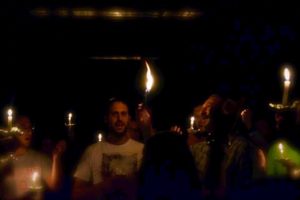I feel too numbed to list the outbursts of hate, sometimes enacted with knives, guns, or rocks; or the statements of political leaders and special-interest stakeholders that often look more like verbal violence than constructive dialogue. But if you keep up with the news in Israel, the Middle East and the U.S., you know the list I’m talking about. The world is experiencing so much darkness, and I’m afraid.

Students at Hebrew Union College-Jewish Institute of Religion in Jerusalem mark the end of Shabbat after sunset with Havdallah. Photo: Josh Gischner
Our early human ancestors lit fires to ward off the dark, and the cold and danger it brought with it. Parents of small children know all too well that darkness can be a nightly nemesis. They combat it with night lights, hugs and whispered words of love and assurance. As humans we struggle against the dark. But Rabbi Ruth Kagan taught recently on Shabbat Breishit that perhaps the darkness just is. It is not good or bad. It merely exists. Her simple suggestion challenged my numbness and brought me back to Creation.
We all know how the story begins:
When God began to create heaven and earth – the earth being unformed and void, with darkness over the surface of the deep and a wind from God sweeping over the water – God said “let there be light;” and there was light. God saw that the light was good and God separated the light from the darkness. God called the light Day, and the darkness God called Night. And there was evening and there was morning, a first day. (Breishit (Genesis) 1:1-5. JPS translation, adapted).
In the opening of our Creation story God calls out for light, which is separated from darkness, and then God calls it good. In the very first moment of goodness in the universe, light was brought out from darkness.
Early humans learned that in the dark their eyes did not allow them to see dangerous predators that may be lurking and ready to strike. As children emerge from infancy and their developing brains begin to comprehend how separate and autonomous each of us are, they fear the profound aloneness they experience at night, tucked into their beds. Perhaps our fear of the darkness is a learned response to the human experience.
Our Creation story shows us that light is dawn from darkness; we cannot have one without the other. The mystic tradition of Kabbalah offers us a way to find meaning in darkness.
In a very basic partial re-telling of the story from a kabbalistic perspective, before Creation all that existed was filled with God. The tradition teaches that when God desired to create the world, God contracted into Godself so that there was an unoccupied space in which Creation could begin. What would it mean if, that instead of only presenting despair, the darkness of world events represents a potential in which we can make light?
This question is not intended to simplify the complex situations from which recent and long-standing violence erupted into Creation. Far from it. But for those of us who experience fear, despair or hopelessness in these painful times – me, too – it is possible to draw strength from remembering that darkness precedes light and that evening inevitably leads to morning, every day.
If the numbness of fear recedes in the presence of campfires, and soothing words, and the remembrance of our Creation story – even just a little – then we can walk into the light, carried by our next steps in repairing the world.
This is the fifth in a series of posts about life in Jerusalem through the eyes, ears and experiences of a first-year rabbinical student. The fourth post can be found here.

